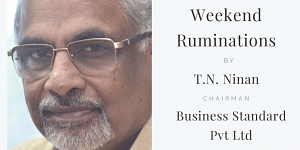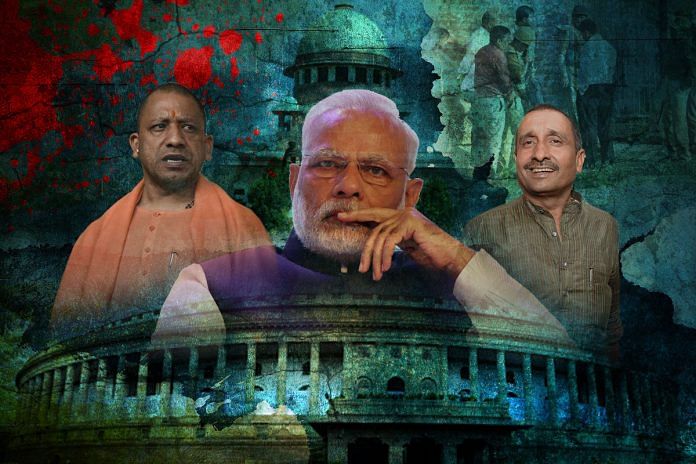A well-ordered society that hopes to do well economically and by its citizens, has to strengthen its foundational institutions.
In his column a couple of days ago, Shankar Acharya focused on wealth (which is stock) rather than gross domestic product, or GDP (which is flow). He rightly stressed the importance of three forms of wealth, or capital — productive, natural/environmental and human — with special emphasis on the last. I would add two more kinds of capital that need to be kept in mind: institutional and social. These are particularly important in the current Indian context.
If one surveys the institutional scene, there is the complete waste of half the budget session — reducing the Lok Sabha to the semi-relevance to which many assemblies have already been reduced; so much so that even a no-confidence motion could not be taken up for discussion and voting. One might add that the BJP protests too loudly that the opposition is to blame.
Consider then the virtually open revolt that is evident in the Supreme Court, with some of the senior-most judges continuing to air publicly, and in the strongest possible language, their concern about the state of affairs in the court — and their fear that (not to put too fine a point on it) the government is trying to pack the court.
 Third, one must consider the state of law and order in what is arguably the country’s most important state. A chief minister with criminal cases against him and a history of leading a vigilante group has presided over his government withdrawing charges against him, promoted vigilante groups, asked the police to control crime by stepping completely outside the framework of law, proposed that the state withdraw cases against selected politicians (you can guess their colour) and not taken the obvious action mandated by law when a party legislator is accused of raping a minor.
Third, one must consider the state of law and order in what is arguably the country’s most important state. A chief minister with criminal cases against him and a history of leading a vigilante group has presided over his government withdrawing charges against him, promoted vigilante groups, asked the police to control crime by stepping completely outside the framework of law, proposed that the state withdraw cases against selected politicians (you can guess their colour) and not taken the obvious action mandated by law when a party legislator is accused of raping a minor.
Finally, one has to consider the decay of social capital and the lack of mutual trust when claims by constituent states of the Union increase in stridency, when needless actions cause communal tension and violence in parts of the northern heartland, when the country’s largest minority feels under majoritarian siege, when political parties in West Bengal, Kerala and elsewhere resort to open violence to settle issues, when the opposition starts distrusting the Election Commission, and when the coming election season is viewed by many with a sense of dread.
A well-ordered society that hopes to do well economically and by its citizens has to strengthen its foundational institutions (parliament, the judiciary, the larger justice system, and the administration). It has to ensure that the machinery for law and order and for tax collection functions under proper oversight, that due process is not cast aside as expendable, that the electoral process is fair, and that fundamental rights are in fact available to citizens. Many of these institutions and rights were under siege during the years of a single person’s political dominance slightly more than four decades ago. The subsequent years of coalition or minority governments, sometimes assumed to mean years of political instability, actually saw key institutions emerging with greater strength — the Election Commission, the judiciary, the press, and civil society at large, among others. The question now is whether the clock is being turned back in a new political phase.
Thirty-eight years ago, all of India was in a state of shock when it was reported that the police in Bhagalpur had resorted to blinding petty criminals. Today policemen are simply killing those considered to be criminals; let alone shock, the campaign is said to enjoy public support. This has been explained as an understandable reaction to years of lawlessness that went before, but society enters a dangerous phase when foundational principles and institutions are seen as mere tactical assets, to be set aside when convenient. Especially when strongman rule and sectarian nationalism have gained new currency in many countries, the importance of social and institutional capital cannot be over-emphasised.
BY SPECIAL ARRANGEMENT WITH BUSINESS STANDARD




Sushil Kumar (comment abve)has very comprehensive comment that India is going through process of churning.I very much agree with his point of view and my personal view is that overall desire to move up from acquiring modern comforts and better life to bottom strata will make inevitable declne of left and unlesshing of enterpriship of Indian Masses.
However Mr.Ninan has expressed a point of view in his current book is very thoughtful thstvdespite wealth creation, disparity will increase.
I have heard lot of rhetoric that institutions have gone weak under Modi’s regime but haven’t seen any objective analysis to support that claim. Until any objective analysis is made available, all I can interpret is it being a play of Congress and its ecosystem.
Having said that, I consider Mr. Ninan very respectable and bright man. I hope The Print has him write more.
Which fool taught you left wing and right wing ideology? Manmohan Singh is by far the biggest economic liberaliser of India. What Modi is doing — following China’s example in everything from his cultural revolution to extreme centralisation of power and even proposal for siimultaneous state and Centre elections IS left wing politics. He is a classic case of no wing-only prayer politics and economics. Congress has leant right on economy since start of 90s. But it is highly debatable if right wing economics or its all out version even suits India. With Modi, his jabs at it, have thoroughly failed. So please understand theories before you write nonsense.
Mr Ninan: It is irrelevant if Indira destroyed institutions or not. If she won war against Pakistan or not. If trains ran on time under her Emergency or not. For most of us in our late 20s, she was dead before we were born. Our concern is now. and today. and here. If everything from Military to Supreme Court to Education to Police to Human Resources Dev Ministry are in utter chaos right now, it is down to Modi. The buck cant pass to Indira or ehru or Akbar or Chanakya or Lord Indra here. It’s Narendra Modi. He has destroyed the social fabric of India. And he has destroyed its institutions. He’s also a threat to the country;s humanity. But since that doesnt get added in GDP, we should be happy to be savages who ae growing at 3.4 percent in the last quarter. With police, CBI, SC, Army all in tatters
Actually India is going through a churning phase. For the last 70 years we have been under the spell of left wing ideology and every institution was led by the left wing people and was filled with the same / similar people. There was some deliberate attempt to denigrate the the people with right wing ideology. So much so that even though the GDP growth was higher durnig Morarji and Narsimha rao period , our left wing media , one of the pillars , never gave them credit for it . Of course some of them even deride that period.
Vajpayeeji followed a middle path and so not derided by left wing ideologists . Narendra Modi has a right wing views and is following them . Pushing right wing people in all the pillars . This is not liked by left wing ideologies. Most of them believed that finally Narendra Modi will start following Atalji . But it has not happened . So all this biased opinions are being written and trying to create unnecessary panic in the people at large. This will continue. Left wing ideologues have to look for their own interest and survival .
It is amazing to see very intelligent people ( including the author above) writing such biased blogs.
Mr. Chelameshwar who has rebelled against current CJI is a clear case of grapes going sour and having personal ego and speaking all lies and all the left wing supporting him without even hinting his personal bias. And we talk of independent judiciary — all false . There are so many articles how these judges have promoted their own kins/ relatives . Not allowing SC/ST / minority advocates to come to higher judiciary . Not allowing the MOP to get finalised . And we blame Govt ?
So I fully agree with the author that all the left wing ideologues are dejected and distraught today. Earlier right wing ideologues were in the same position .
This fight is going to continue . So be it. Our aim is a strong India , good India . Jai Hind !!
The passouts the Nehruvian system, feeling orphaned, have beceome cry-babies. They desperately need one of their own at the helm. What about a Manmohan-singh-like as PM that can bring some solace to the distaught and dejected? Modi sure is not the one.
I am also worried about the decay in government institutions. Departments are not doing routine jobs. Check out govt websites. Information is not updated. Data is outdated. No real statistics available. All that seems to be happening is rhetorics, events and publicity. All centred around one individual. Government was always meant to be in the background, enabling it’s citizens. Now government has become all pervasive and citizens are being made to fight for recognition and space. Sad.
Diminishing returns from the factors of religion and hyper-nationalism is already evident (Gujarat), and by the time BJP realises this, returns would have turned negative. The acceleration will start with Karnataka poll results.
History will rate Pandit Nehru more highly than Mrs Gandhi, despite the pain of 1962 and the glory of 1971. He nurtured the institutions a young democracy and a fledgling economy would need to succeed, in the face of such forbidding odds. She drove a steam locomotive through them. 2. Mrs Gandhi wanted a committed bureaucracy and judiciary, a docile or subservient press. She may have regarded them as a hindrance to all she wanted to achieve for her country. Not realising that her industry and integrity could not reach undimmed and undiminished to each patwari and gram sevak in the furthermost corners of India, any more than the CM of UP can ensure the availability of medicines and oxygen cylinders in a government hospital even in his own constituency. Strong institutions, staffed by persons of competence and integrity, serve as force multipliers, not obstructions to a ruler’s power and popularity. When the banking system is in crisis, the power sector is troubled, economic growth and job creation are undermined, hurting electoral prospects. What starts as aggrandisement of power ends up melting it.